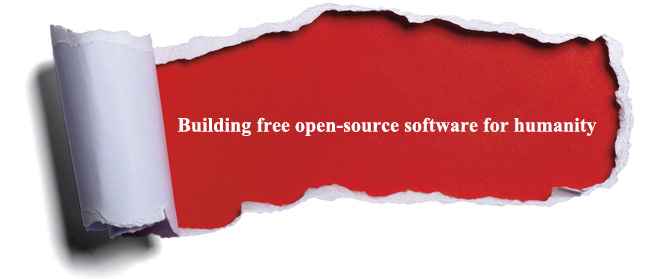
features |
1 > |

The Humitarian Free and Open Source Software Project (HFOSS)
by Mary Howard
“So often in computer science class, you’re writing programs that are exercises. You build a program only to throw it away,” says Trishan de Lanerolle ’04, project director of the Humanitarian Free and Open Source Software Project (HFOSS). Through HFOSS, Trinity’s computer science students are writing programs that have realworld applications. HFOSS — a joint effort between computer science departments at Trinity, Wesleyan, and Connecticut College — aims to engage students in computer science through the development of opensource software that aids global relief efforts and builds communities.
Open-source software can be modifi ed and freely distributed. Linux, Firefox, and Wikipedia are all popular examples.
Recently, a team of Trinity students and faculty developed an application for Android mobile phones that will aid ACDI/VOCA, a Washington, D.C.-based international development organization, with food distribution in Haiti. “They are a huge humanitarian group, and they found us online and asked us for help,” says Ralph Morelli, professor of computer science and principal investigator of HFOSS.
Last summer, Morelli, de Lanerolle, and four students traveled to Haiti for 10 days to train local personnel and conduct several field trials. The team was a bit worried about how the application would be received by the auxiliary nurses who would be the end users. But despite their lack of experience with smart phones, the nurses responded positively to the application, says de Lanerolle.
“Our mobile application allows them to more efficiently register new beneficiaries during registration events,” says Alexandre Zhang ’14, one of the student developers who traveled to Haiti. “Prior to our application being used, it took several weeks for Haitians to get registered and processed. The road conditions are really bad, and in rural areas there’s no way to get the information to the main office fast enough.” And this is only one example of the real-world projects HFOSS sponsors.
Coordinating relief efforts
Trinity students have written code for OpenMRS, an open-source medical-record system used to deliver health care in developing countries, and, more locally, they’ve created a program that helps the New York City Red Cross. When disaster struck in China in 2008 with a 7.8 magnitude earthquake, leaving death and destruction in its wake, HFOSS students helped write the software used to coordinate volunteers for relief efforts.
In September of 2010, HFOSS students Pauline Lake ’13 and Nina Limardo ’11 traveled to the White House after winning first place in a competition designed to promote healthy food choices and physical fitness in children. Their smart phone application, called Work it Off, is an open source tool that lets children know the calorie content in a given food and what types of physical activity can burn off those calories.
|
| 1 > |
